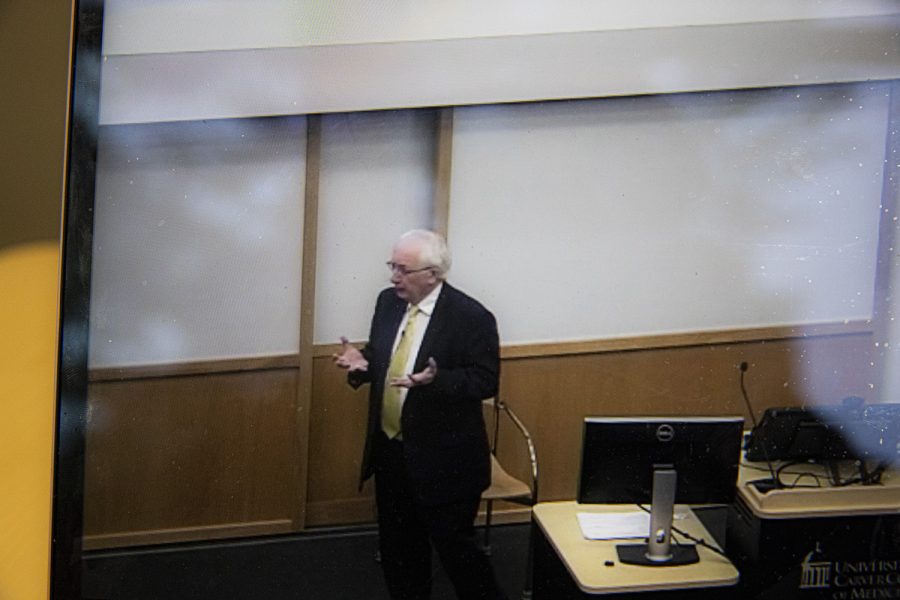Bradley Britigan discusses future of education at Medical Education Research Facility
Britigan, the fourth finalist for vice president for medical affairs and Carver College of Medicine Dean, focused on his goals and missions for the University of Iowa at his open forum on Thursday.
The fourth Vice President for Medical Affairs was announced on Zoom on Thursday, Sep. 1, 2022
September 1, 2022
The fourth vice president for medical affairs and Carver College of Medicine Dean finalist Bradley Britigan focused on goals and missions for the University of Iowa during an open forum on Thursday.
In the Prem Sahai Auditorium of the Medical Education Research Facility, staff, faculty, and students gathered to hear Britigan and ask questions.
Britigan is the final candidate being considered for the position occupied by current Vice President of Medical Affairs and Dean of the College of Medicine Brooks Jackson. Jackson will hold the position until a candidate has been chosen after announcing his departure from the position in February.
At the University of Nebraska, Britigan is the Stokes-Shackleford Professor and Dean of the University of Nebraska Medical Center College of Medicine in Omaha, a position he has held since 2011.
He co-oversees the University of Nebraska Medical Center family practice plan with the leaders of Nebraska Medicine and Children’s Hospital. His research interests are internal medicine and infectious diseases.
Medical education, specifically undergraduate medical education, is the main mission of public colleges, according to Britigan. A curriculum more suited for personalized learning for students is a change that can be implemented, he said.
“Technological advances offering new learning opportunities and simulation facilities are, in my mind, going to be absolutely critical to being able to provide the optimal type of education,” Britigan said.
Britigan also discussed establishing and enhancing education programs for rural and urban health physician shortages. He collaborates on the Rural Health Opportunities Program, a high school program in Nebraska that allows students to transition into college with guaranteed admission to the medical school.
He would also like to explore implementing these types of programs at the UI, he said.
Britigan said research is important to a health system because it drives the system’s reputation. Research is transferred to clinical care and attracts patients because they will seek cutting-edge research, he said.
Britigan also talked about his plans for research at the UI, which included potentially constructing a bigger research building and examining what the hospitals and clinics are doing well.
“…Taking and looking at what UIHC’s clinical strengths are and build research programs around them, and go the other way around, so that you’ve got this continuity of research…” Britigan said.
Britigan also discussed clinical care from the standpoint of a post-COVID-19 world. He said the workforce shortage that stemmed from the pandemic helped limit the ability of patient care.
“Basically, the focus would be on all those demands I outlined before, but first and foremost, you got to recruit a health systems CEO, everything kind of flows from there…” Britigan said.
Overall, for former UI professor Britigan, coming back to Iowa would not be a difficult feat.
“Hopefully as a result of this talk, conversations that we’re going to have, and if you remain interested,” he said. “I may be moving back over to Iowa and would certainly love to have that opportunity.”














